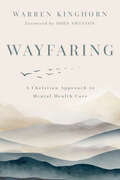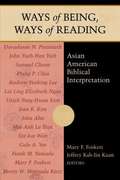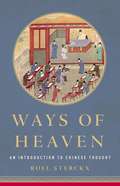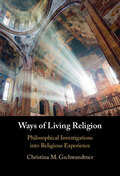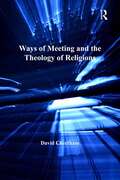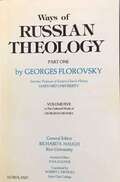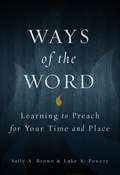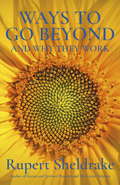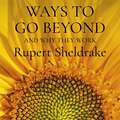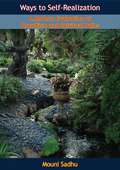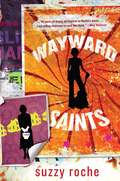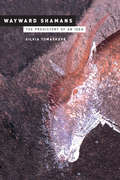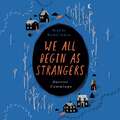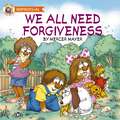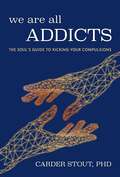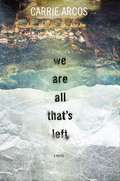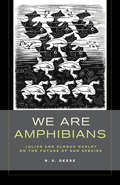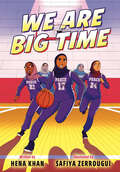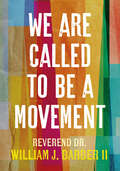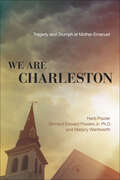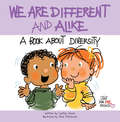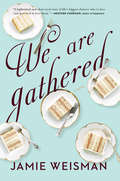- Table View
- List View
Wayfaring: A Christian Approach to Mental Health Care
by Warren KinghornA theologically and scientifically engaged exploration of modern mental health care The current model of mental health care doesn&’t see people: it sees sets of symptoms that need fixing. While modern psychiatry has improved many patients&’ quality of life, it falls short in addressing their relational and spiritual needs. As a theologian and practicing psychiatrist, Warren Kinghorn shares a Christian vision of accompanying those facing mental health challenges. Kinghorn reviews the successes and limitations of modern mental health care before offering an alternative paradigm of healing. Based in the theology of Thomas Aquinas, this model of personhood affirms four truths: We are known and loved by God. We are creatures made of earth who are formed in community. We are wayfarers on a journey. We are called not to control, but to wonder, love, praise, and rest. Drawing on theological wisdom and scientific evidence, Kinghorn reframes our understanding of mental health care from fixing machines to attending fellow wayfarers on the way to the Lord&’s feast. With gentle guidance and practical suggestions, Wayfaring is an essential resource for pastors and practitioners as well as for Christians who seek mental health care.
Ways of Being, Ways of Reading: Asian American Biblical Interpretation
by Mary Foskett Jeffrey KuanWays of Being, Ways of Reading is a collection of essays that address biblical interpretation and the Bible's role from an Asian North point of view. Beginning with the history of biblical interpretation in Asian countries and cultures, this impressive collection by noted contemporary scholars, address issues and themes such as cultural hermeneutics, the politics of identity, and what constitutes Asian American theology. Contributors include: Devadasan N. Premnath, John Yueh-Han Yieh, Samuel Cheon, Philip P. Chia, Andrew Yueking Lee, Lai Ling Elizabeth Ngan, Uriah Yong-Hwan Kim, Jean K. Kim, John Ahn, Mai-Anh Le Tran, Sze-Kar Wan, Gale A. Yee, Frank M. Yamada, Mary F. Foskett, and Henry W. Morisada Rietz
Ways of Heaven: An Introduction to Chinese Thought
by Roel SterckxA brilliant history of ancient China's masters of philosophy -- and how they help us understand China today In Ways of Heaven, leading China scholar Roel Sterckx offers an engrossing introduction to classical China's world of ideas. Drawing on evocative examples from philosophical texts, literature, and everyday life over centuries of Chinese history, Sterckx introduces major thinkers and traditions, illuminates key concepts like the dao, qi, yin, and yang, and examines questions of leadership, social order, death, nature, and more. He also reveals how these ideas shape contemporary China, from table manners at a traditional banquet, to the Chinese obsession with education and family, to the rhetoric of political leaders and the nation's grand strategy. Essential reading for students, travelers, businesspeople, and anyone curious about this rising global power, Ways of Heaven shows that to comprehend China today we must learn to think Chinese.
Ways of Living Religion: Philosophical Investigations into Religious Experience
by Christina M. GschwandtnerWays of Living Religion provides a philosophical analysis of different types of religious experience - ascetic, liturgical, monastic, mystical, devotional, compassionate, fundamentalist - that focuses on the lived experience of religion rather than reducing it to mere statements of belief or doctrine. Using phenomenology, Christina M. Gschwandtner distinguishes between different kinds of religious experiences by examining their central characteristics and defining features, as well as showing their continuity with human experience more broadly. The book is the first philosophical examination of several of these types, thus breaking new ground in philosophical thinking about religion. It is neither a confessional treatment nor a reduction of the lived experience to psychological or sociological phenomena. While Gschwandtner's treatment focuses on Christian forms of expression of these different types, it opens the path to broader examinations of ways of living religion that might enable scholars to give a more nuanced account of their similarities and differences.
Ways of Meeting and the Theology of Religions (Transcending Boundaries in Philosophy and Theology)
by David CheethamExploring the different points of view and 'tones of voice' adopted in theology for the meeting of religions, this book presents a contemporary philosophical and theological engagement with key issues of how different faiths might meet, of comparative philosophy of religion, of the use of aesthetics, of inter-religious ethics and issues relating to the self. Providing a critical evaluation of contemporary liberal, post-liberal and conservative voices, and an engagement with movements such as Radical Orthodoxy and Scriptural Reasoning to mention a few, this book highlights the use of the creative imagination and explores new ideas for the meeting of religions.
Ways of Russian Theology
by Georges FlorovskyWays of Russian Theology, Part One (Collected Works of Georges Florovsky, 5) (English and Russian Edition)
Ways of the Word: Learning to Preach for Your Time and Place
by Sally Brown Luke PoweryPreaching, and the discipline of preaching, is at a crossroads. The changing realities of church and theological education, the diversity of our classrooms, and our increasingly complex community contexts leave us in search of tools to help train a rising generation of preachers for a future whose contours are far from clear. The questions are immense: How to support preachers in contexts that are diverse religiously, culturally, and ethnically, both inside and outside the church? How to help students take varied contexts seriously as they are formed as leaders? <p><p> In Ways of the Word, a dynamic team of master preachers brings much-needed help. Different in race, gender, age, and tradition, both Sally A. Brown and Luke A. Powery speak with one voice their belief that preaching is-Spirit-empowered event: an embodied, vocalized, actively received, here-and-now witness to the ongoing work of God in the world. <p> They aspire to help students and preachers alike to reflect on a journey of learning by doing. They aim to help preachers to become more attuned to the Spirit, more adept in preaching's component skills, and more self-aware about all that is at stake in proclaiming the redemptive work of God in specific contexts.
Ways to Go Beyond and Why They Work: Seven Spiritual Practices in a Scientific Age
by Rupert SheldrakeTo go beyond is to move into a higher state of consciousness, to a place of bliss, greater understanding, love, and deep connectedness, a realm where we finally find life's meaning - experiences for which all spiritual seekers seek.Dr Rupert Sheldrake, writing as both a scientist and a spiritual explorer, looks at seven spiritual practices that are personally transformative and have scientifically measurable effects. He combines the latest scientific research with his extensive knowledge of mystical traditions around the world to show how we may tune into more-than-human realms of consciousness through psychedelics, such as ayahuasca, and by taking cannabis. He also shows how everyday activities can have mystical dimensions, including sports and learning from animals. He discusses traditional religious practices such as fasting, prayer, and the celebration of festivals and holy days.Why do these practices work? Are their effects all inside brains and essentially illusory? Or can we really make contact with forms of consciousness greater than our own? We are in the midst of a spiritual revival. This book is an essential guide.
Ways to Go Beyond and Why They Work: Seven Spiritual Practices in a Scientific Age
by Rupert SheldrakeBy the author of The Science Delusion a detailed account of how science can authenticate spiritualityTo go beyond is to move into a higher state of consciousness, to a place of bliss, greater understanding, love, and deep connectedness, a realm where we finally find life's meaning - experiences for which all spiritual seekers seek.Dr Rupert Sheldrake, writing as both a scientist and a spiritual explorer, looks at seven spiritual practices that are personally transformative and have scientifically measurable effects. He combines the latest scientific research with his extensive knowledge of mystical traditions around the world to show how we may tune into more-than-human realms of consciousness through psychedelics, such as ayahuasca, and by taking cannabis. He also shows how everyday activities can have mystical dimensions, including sports and learning from animals. He discusses traditional religious practices such as fasting, prayer, and the celebration of festivals and holy days.Why do these practices work? Are their effects all inside brains and essentially illusory? Or can we really make contact with forms of consciousness greater than our own? We are in the midst of a spiritual revival. This book is an essential guide.(P)2019 Hodder & Stoughton Limited
Ways to Self-Realization: A Modern Evaluation of Occultism and Spiritual Paths
by Mouni SadhuFirst published in 1962, this book is the follow-up to author Mouni Sadhu’s three previous works: “In Days of Great Peace”, “Concentration” and “Samadhi.”A noted Occultist and Mystic of the first half of the Twentieth Century, Sadhu tried many paths on the route to self-realization, and is thus uniquely qualified to relate the truths in this book. Steeped in the Hermetic schools which abounded at the turn of the 19th century, then embracing the teachings of Sri Ramana Maharshi and Vichara—yet never forgetting his Catholic faith—Mouni Sadhu successfully advances our mental synthesis and leads us to the door of True Self.“The occultist who seeks to find answers to everything by means of mental understanding may find some assistance on this path in the following chapters. On the other hand, spiritually minded persons may discover confirmation of their own inner longings, when they read about the reality and possibility of the Ultimate Realization and about the necessary steps toward it.“It is in this hope that I have collected here a number of essays that have been partly published during the past seven years, rounding them out with some new chapters especially written for the purpose of the present book.“It is essentially a series of essays on various aspects of occultism and the spiritual experience.”
Wayward Saints
by Suzzy RocheFrom a folk-rock legend comes a tender, comic story of family, music, and second chances. Mary Saint, the rule-breaking, troubled former lead singer of the almost-famous band Sliced Ham, has pretty much given up on music after the trauma of her band member and lover Garbagio's death seven years earlier. Instead, with the help of her best friend, Thaddeus, she is trying to piece her life together while making mochaccinos in San Francisco. Meanwhile, back in her hometown of Swallow, New York, her mother, Jean Saint, struggles with her own ghosts. When Mary is invited to give a concert at her old high school, Jean is thrilled, though she's worried about what Father Benedict and her neighbors will think of songs such as "Sewer Flower" and "You're a Pig." But she soon realizes that there are going to be bigger problems when the whole town--including a discouraged teacher and a baker who's anything but sweet--gets in on the act.Filled with characters that are wild and original, yet still familiar and warm--plus plenty of great insider winks at the music industry--Wayward Saints is a touching and hilarious look at confronting your past and going home again.ow all about her perfect pitch, her angel's voice, her subtle wit. Her masterful debut novel, Wayward Saints, mines these same prodigious gifts. When Mary Saint, a once-promising indie rocker, is invited to perform in her hometown, where her mother, Jean, still holds court, the two are forced into a long-deferred reckoning: with each other and with the demons of their past. This is a golden-threaded tale of redemption, of the transformative powers of art, and of the mysteries, pains, and sacrifices of love."--Deborah Copaken Kogan, author of Hell Is Other Parents and The Red Book "Spoiler alert: this book is wonderful from beginning to end. I loved every page."--Patricia Marx, author of Starting from Happy
Wayward Shamans
by Silvia TomáškováWayward Shamans tells the story of an idea that humanity's first expression of art, religion and creativity found form in the figure of a proto-priest known as a shaman. Tracing this classic category of the history of anthropology back to the emergence of the term in Siberia, the work follows the trajectory of European knowledge about the continent's eastern frontier. The ethnographic record left by German natural historians engaged in the Russian colonial expansion project in the 18th century includes a range of shamanic practitioners, varied by gender and age. Later accounts by exiled Russian revolutionaries noted transgendered shamans. This variation vanished, however, in the translation of shamanism into archaeology theory, where a male sorcerer emerged as the key agent of prehistoric art. More recent efforts to provide a universal shamanic explanation for rock art via South Africa and neurobiology likewise gloss over historical evidence of diversity. By contrast this book argues for recognizing indeterminacy in the categories we use, and reopening them by recalling their complex history.
Wayward Winds
by Michael PhillipsHigh above the English coastline, political storms swirled far more turbulent than any natural storm. Indeed, the silent clouds moving steadily but inexorably westward were thick and black and worldwide in their scope. Yet few apprehended the threat. It was not only nationalism, liberalism, the rising expectation of the middle class, and the political instability of the European power structure that made this a dangerous time. There were unseen currents of deceit and deception lurking silent but lethal beneath the surface of European affairs. And some, masquerading under a cloak of truth and enlightenment, gave no hint of their subversive loyalties. As England and the rest of Europe approach a climax when the world will be changed forever, the Aurnerrorout or Devonshire stand, too, in a peril they have no way to foresee. Estranged from her family, twenty-year-old Amanda has left Heathersleigh Hall for what seems an exciting world in prewar London and the suffragette movement. Determined to make an impact and stand on her own two feet, she has no idea of danger surrounding her on all sides.
We All Begin As Strangers: A gripping novel about dark secrets in an English village
by Harriet CummingsHeathcote, England - 1984A mysterious figure is sneaking into homes through backdoors and open windows. Known locally as 'the Fox', he knows everything about everyone - leaving curious objects in their homes, or taking things from them.When beloved Anna disappears, everyone believes the Fox is responsible.For the villagers, finding Anna will be difficult - but stopping the Fox from exposing their darkest secrets might just be impossible...(p) 2017 Orion Publishing Group Ltd
We All Need Forgiveness
by Mercer MayerJoin Little Critter® as he learns forgiving not only helps others--it makes him feel better too!Since 1975, Mercer Mayer has been writing and illustrating stories about Little Critter® and the antics he stumbles into while growing up. Tommy Nelson is thrilled to bring this beloved brand to the Christian market with the Inspired Kids line of faith-based books featuring Little Critter.In We All Need Forgiveness, Little Critter is glad he has such nice friends who forgive him when he makes mistakes. But when one of his friends accidentally does something that affects him, Little Critter gets upset and stays angry at his friend for a while. But Little Critter's pals teach him that saying "it's okay" helps the person who acted up--and it helps him feel better much sooner.Just like Mama says, "As God forgives, we must forgive each other." Based on Matthew 6:14, Little Critter learns why forgiveness helps heal the one who does the forgiving just as much as the one who needs forgiveness.Features & Benefits:Little Critter® brand has humorously portrayed issues kids face for almost 40 yearsFaith-inspired message shows kids how to develop a spirit of forgivenessOver 150 million Little Critter books sold
We All Need Forgiveness
by Mercer MayerJoin Little Critter® as he learns forgiving not only helps others—it makes him feel better too!Since 1975, Mercer Mayer has been writing and illustrating stories about Little Critter® and the antics he stumbles into while growing up. Tommy Nelson is thrilled to bring this beloved brand to the Christian market with the Inspired Kids line of faith-based books featuring Little Critter.In We All Need Forgiveness, Little Critter is glad he has such nice friends who forgive him when he makes mistakes. But when one of his friends accidentally does something that affects him, Little Critter gets upset and stays angry at his friend for a while. But Little Critter’s pals teach him that saying “it’s okay” helps the person who acted up—and it helps him feel better much sooner.Just like Mama says, “As God forgives, we must forgive each other.” Based on Matthew 6:14, Little Critter learns why forgiveness helps heal the one who does the forgiving just as much as the one who needs forgiveness.Features & Benefits:Little Critter® brand has humorously portrayed issues kids face for almost 40 yearsFaith-inspired message shows kids how to develop a spirit of forgivenessOver 150 million Little Critter books sold
We Are All Addicts: The Soul's Guide to Kicking Your Compulsions
by Carder Stout, PhDSpirituality is a powerful thing, but can connecting with one's soul help kick addictive behaviors? Find out in Dr. Carder Stout's self-help must read. . .In We Are All Addicts: The Soul&’s Guide to Kicking Your Compulsions, Dr. Stout offers spiritual solutions to the complex problems created by addiction. He focuses primarily on the idea of the soul and how this authentic voice has the ability to heal addictive cycles. The soul is pure consciousness untethered from human experience and Dr. Stout will demonstrate how to connect deeply to it through exercises, meditations, visualizations and writing. These solutions to the obsessive thinking and compulsive actions caused by addiction are unconventional and most of them have only been shared with his patients in therapy. Dr. Stout believes that the soul has the capacity to completely remove addiction from the psyche. He uses these exercises himself and has been sober for fifteen years. As an expert therapist treating clients for addiction, anxiety, depression, trauma, and relationships, Dr. Stout is adept at helping clients become more truthful with themselves. It is with this expertise, he breaks down his theory of "We Are All Addicts" in a compellingly readable guide so you can understand the addiction getting in the way of your life and how to overcome it by connecting to the ultimate truth of your core being and learning to love yourself to the fullest.
We Are All That's Left
by Carrie Arcos<p>Two lives. Two worlds apart. One deeply compelling story set in both Bosnia and the United States, spanning decades and generations, about the brutality of war and the trauma of everyday life after war, about hope and the ties that bind us together. <p>Zara and her mother, Nadja, have a strained relationship. Nadja just doesn't understand Zara's creative passion for, and self-expression through, photography. And Zara doesn't know how to reach beyond their differences and connect to a closed-off mother who refuses to speak about her past in Bosnia. But when a bomb explodes as they're shopping in their local farmers' market in Rhode Island, Zara is left with PTSD--and her mother is left in a coma. Without the opportunity to get to know her mother, Zara is left with questions--not just about her mother, but about faith, religion, history, and her own path forward. <p>As Zara tries to sort through her confusion, she meets Joseph, whose grandmother is also in the hospital, and whose exploration of religion and philosophy offer comfort and insight into Zara's own line of thinking. <p>Told in chapters that alternate between Zara's present-day Providence, RI, and Nadja's own childhood in Bosnia and Herzegovina during the Bosnian War of the 1990s, We Are All That's Left shows the ways in which, no matter the time and place, struggle and tragedy can give way to connection, healing and love.</p>
We Are Amphibians: Julian and Aldous Huxley on the Future of Our Species
by R. S. DeeseWe Are Amphibians tells the fascinating story of two brothers who changed the way we think about the future of our species. As a pioneering biologist and conservationist, Julian Huxley helped advance the "modern synthesis” in evolutionary biology and played a pivotal role in founding UNESCO and the World Wildlife Fund. His argument that we must accept responsibility for our future evolution as a species has attracted a growing number of scientists and intellectuals who embrace the concept of Transhumanism that he first outlined in the 1950s. Although Aldous Huxley is most widely known for his dystopian novel Brave New World, his writings on religion, ecology, and human consciousness were powerful catalysts for the environmental and human potential movements that grew rapidly in the second half of the twentieth century. While they often disagreed about the role of science and technology in human progress, Julian and Aldous Huxley both believed that the future of our species depends on a saner set of relations with each other and with our environment. Their common concern for ecology has given their ideas about the future of Homo sapiens an enduring resonance in the twenty-first century. The amphibian metaphor that both brothers used to describe humanity highlights not only the complexity and mutability of our species but also our ecologically precarious situation.
We Are Big Time: (A Graphic Novel)
by Hena KhanSWISH! Cheer courtside for a Muslim teen as she joins an all-girls, hijab-wearing basketball team and learns that she&’s much more than a score. This energetic graphic novel is inspired by a true story!&“A slam dunk!" —Minh LêAliya is new to Wisconsin, and everything feels different than Florida. The Islamic school is bigger, the city is colder, and her new basketball team is…well, they stink.Aliya&’s still excited to have teammates (although the team's captain, Noura, isn't really Aliya's biggest fan), and their new coach really understands basketball (even if she doesn't know much about being Muslim). This season should be a blast...if they could just start to win. As they strengthen their skills on the court, Aliya and the Peace Academy team discover that it takes more than talent to be great--it's teamwork and self-confidence that defines true success. For fans of The Crossover and Roller Girl, this graphic novel goes big with humor and heart as it explores culture and perceptions, fitting in and standing out, and finding yourself, both on and off the court.
We Are Called to Be a Movement
by William BarberIt's time for everyone who cares about the state of our nation to heed the call and join forces to redeem the soul of America. It's time to come together and renounce the politics of rejection, division, and greed. It's time to lift up the common good, move up to higher ground, and revive the heart of democracy. In a single, rousing sermon, the celebrated Reverend William J. Barber II of the Poor People&’s Campaign makes an impassioned argument whose message could not be clearer: It's time for change, and the time needs you.
We Are Charleston: Tragedy and Triumph at Mother Emanuel
by Herb Frazier Marjory Wentworth Bernard Edward Powers Jr.We Are Charleston not only recounts the events of that terrible day but also offers a history lesson that reveals a deeper look at the suffering, triumph, and even the ongoing rage of the people who formed Mother Emanuel A.M.E. church and the wider denominational movement.On June 17, 2015, at 9:05 p.m., a young man with a handgun opened fire on a prayer meeting at the Mother Emanuel African Methodist Episcopal (AME) Church in Charleston, South Carolina, killing nine members of the congregation. The captured shooter, twenty-one-year-old Dylan Roof, a white supremacist, was charged with their murders. Two days after the shooting, while Roof&’s court hearing was held on video conference, some of the families of his nine victims, one by one, appeared on the screen—forgiving the killer. The &“Emanuel Nine&” set a profound example for their families, their city, their nation, and indeed the world.In many ways, this church&’s story is America&’s story—the oldest A.M.E. church in the Deep South fighting for freedom and civil rights but also fighting for grace and understanding. Fighting to transcend bigotry, fraud, hatred, racism, poverty, and misery. The shootings in June 2015, opened up a deep wound of racism that still permeates Southern institutions and remains part of American society. We Are Charleston tells the story of a people, continually beaten down, who seem to continually triumph over the worst of adversity. Exploring the storied history of the A.M.E. Church may be a way of explaining the price and power of forgiveness, a way of revealing God&’s mercy in the midst of tremendous pain. We Are Charleston may help us discover what can be right in a world that so often has gone wrong.
We Are Different and Alike
by Anne Fitzgerald Cynthia GeisenWe only have to look at the world around us to find diversity: cats, dogs, birds, people . . . no two of us are exactly alike. Every creature is unique and every person has his or her own individual personality, talents, and interests. In We Are Different and Alike, author Cynthia Geisen helps young people understand and appreciate the diversity of the world around us and its many expressions in families, faiths, races, and cultures.
We Are Gathered
by Jamie WeismanHumor and sorrow join together in Jamie Weisman’s captivating debut novel—the story of an interfaith wedding from the perspectives of its (adoring, envious, resentful, hilarious) guests One afternoon in Atlanta, Georgia. Two people heading to the altar. One hundred fifty guests. The bride, Elizabeth Gottlieb, proud graduate of the University of Virginia and of Emory University School of Law, member of Atlanta’s wealthy Jewish elite. The groom, Hank Jackson, not a member. Not a Jew. The couple of the hour, however, is beside the point, because We Are Gathered belongs to the guests. Among them, Carla, Elizabeth’s quick-witted, ugly duckling childhood best friend turned Hollywood film scout, whose jaundiced view of the drama that is an American wedding provides a lens of humor and its corollary, deep compassion for the supporting actors who steal the show; Elizabeth’s great-aunt Rachel, a Holocaust survivor from Germany who is still navigating a no-man’s-land between cultures and identities decades after escaping from the forests of Europe; Elizabeth’s wheelchair-bound grandfather Albert, who considers his legacy as a man, both in the boardroom and the bedroom; and Annette, the mother of the bride herself, reminded now of her youthful indiscretions in love and motherhood. Balancing razor-sharp humor with a blunt vision of the fragility of our mortal bonds, Jamie Weisman skillfully constructs a world—and family—that pulls you in and carries you along with its refreshing, jagged beauty.
We Are Gathered
by Jamie Weisman"A big-hearted and clear-eyed story of life’s biggest choices: who to love and how best to love them…Compulsively readable and oh so worth the read." —Heather Harpham, author of Happiness: The Crooked Little Road to Semi-Ever After YOU ARE INVITED… To the wedding of Elizabeth and Hank. But the bride and groom are beside the point. Because, on this hot Atlanta afternoon, the people of the hour are the wedding’s (adoring, envious, resentful, hilarious) guests. Among them, Carla, Elizabeth’s quick-witted, ugly duckling childhood best friend turned Hollywood film scout with a jaundiced view on life (and especially on weddings); Elizabeth’s great-aunt Rachel, who is navigating a no-man’s-land between cultures and identities; Elizabeth’s wheelchair-bound grandfather Albert, who considers his legacy as a man in the boardroom, but mostly in the bedroom; and Annette, the mother of the bride, reminded now of her youthful indiscretions in love. Tender and bitingly funny, We Are Gathered pulls you in and carries you through a (dysfunctional, loving, witty, unforgettable) world and family; it is a not-to-be-missed debut from a “writer to watch” (Caroline Leavitt).
